Tribute to
George F. Bass
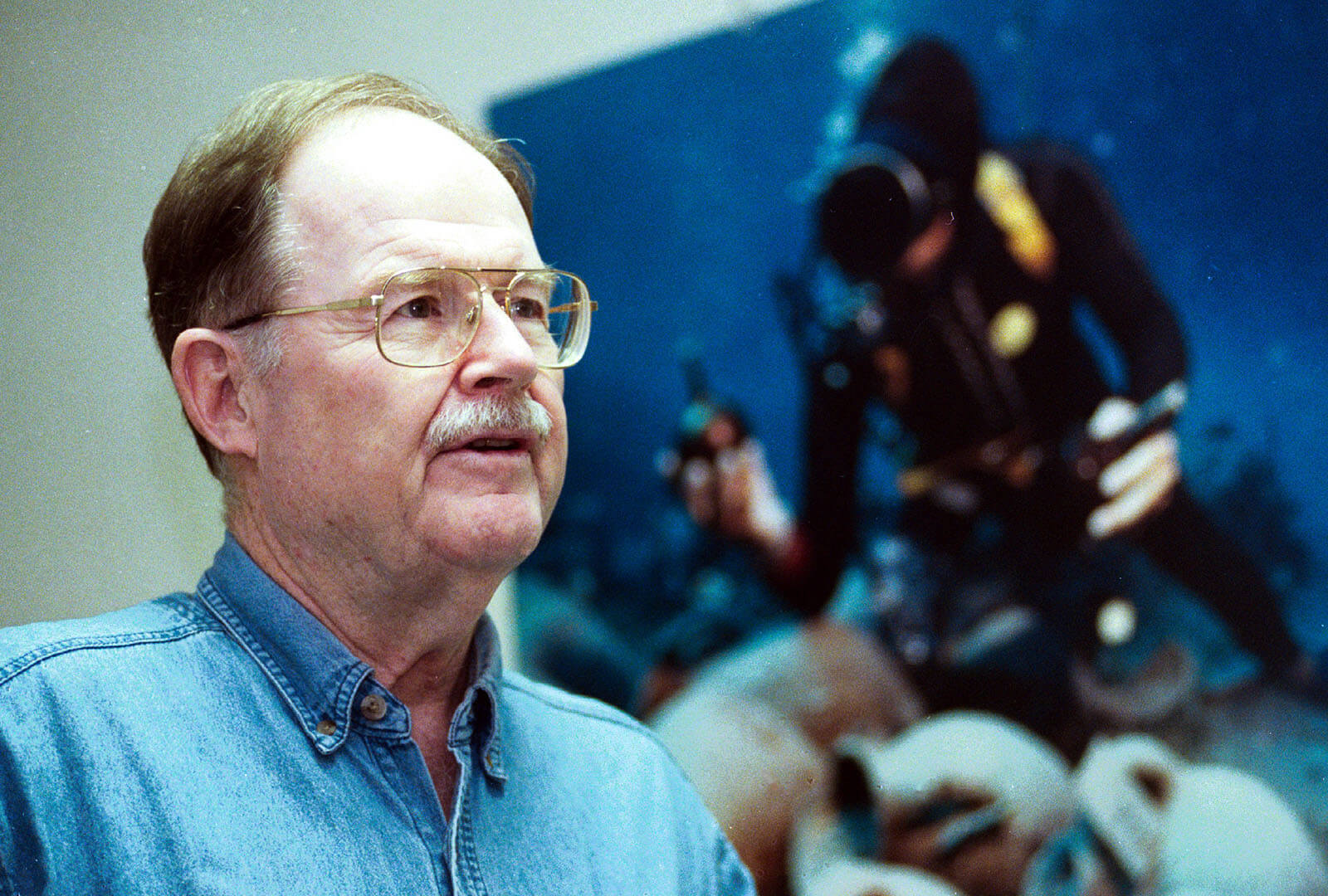
If you are among the thousands of friends, colleagues, students, and enthusiasts who were influenced by the life and legacy of George Bass, please send your tribute and photos to remembergeorge@nauticalarch.
George Bass & the Asherah
This short edited film features original footage from 1964, when George Bass and his team worked to locate shipwrecks off the Turkish coast, at which time nautical archaeology was in its infancy.
The edit is by Penn Museum Film Archivist Kate Pourshariati
All rights are reserved by Penn Museum
Our hearts are warmed by your eloquent tributes, photographs, anecdotes, and memories. It brings us great happiness to be reminded that George touched so many lives. We’re deeply grateful to you all.
-Ann, Gordon, and Alan Bass
”I was very saddened by the news of George's passing. George was my mentor and a wonderful friend. I first met George nearly fifty years ago and his patient guidance, encouragement and support made it possible for me to become a maritime archaeologist. I can't begin to describe all the ways that he influenced my life and career, so I will simply say that his passing has left a void in my heart that will never be filled. I am grateful that George had so many productive years in his incredible career and I am thankful for the opportunity and honor of knowing him. I hope that Ann, their sons, and the rest of his family will find strength and support in knowing that George will live always in the memories of the many, many people that he has known and influenced. Fair winds and following seas, George.
Here's George taking a break before dinner during [A]INA's very successful 1973 survey of the southern Turkish coast. I learned so much from him that summer!
John BroadwaterMaritime Archaeologist
”Sualtı arkeolojisinin kurucusu, çok değerli bilim insanı George F. Bass'ın ölümünden büyük üzüntü duyuyoruz. Sualtı kazı ve araştırmalarındaki disiplinli çalışmalarıyla, ülkemiz sualtı arkeolojisi ve müzemize yaptığı katkılarından dolayı George F. Bass'ı daima saygıyla anacağız. Huzurla uyusun.
Bodrum Sualtı Arkeoloji Müzesi Müdürlüğü
”I should start to write a book and I should call it "Me & George"...
He and his memories will live within us until the time of our last breath..
Ayhan SicimoğluAINA, INA and TINA
”Thanks for being such an inspirer and for all you have done for our discipline.
Staffan von Arbin, Sweden
”Dr. Bass was not only the pioneer of nautical archaeology, but as a long-time friend and resident of Bodrum, a good neighbor as well. Dear Dr. Bass, we owe so much to you, and will never forget you. God bless you and rest in peace.
Murad Gurmeric Bodrum, Turkey
”George Bass changed the course of my life. While a sophomore at Swarthmore in 1961 I heard that he intended to excavate a Byzantime ship off the barren island of Yassi Ada near Bodrum, Turkey and that he was looking for an artist and other specialists who could learn to dive and bring their skills 120 feet under water. At his office at the Penn Museum he took a painted Greek pot off the storage shelves, showed me a published drawing in the style archaeologists use, and set out the paper, pen and ink for the job. Some hours later he invited me to take a YMCA diving course and join his new team in Turkey. On his dig 4 summers later I met my future husband Michael who would go on to excavate the Hellenistic Kyrenia Ship along the north coast of Cyprus. With Michael’s passing my days are filled with publishing those results. Working after college as George’s secretary and being courted by Michael brought happy evenings for us at the Bass home, accompanied by expertly crafted dry martinis. And it was over martinis that Michael and I hatched the idea for a safety refuge for divers known as the “telephone booth”. So tonight I will raise my glass to the Bass family and to all of you who have been touched by their energy and blessed to know them.
Susan W. Katzev
”Dr. George Bass was, if nothing else, a forward thinker. His many expeditions and publications attest to that. One of his forward “thinks” helped the U. S. National Marine Fisheries Service in Hawaii engage in underwater surveys in 1965 in waters up to 600 feet deep near outside of Honolulu, Hawaii. He made his two person submersible Asherah available to the NMFS to make surveys of skipjack tuna (first ever), other pelagic fish and many bottom dwellers. For example the Asherah dives encountered so many spiny lobsters the observers could hardly believe their eyes. This, and many other dives resulted in another paper citing George Bass. He was instrumental in having it published.. The Paper is by: Strasburg, D.W., E.C. Jones & R.T.B. Iversen. 1968. “Use of a Small Submarine For Biological and Oceanographic Research.” In Extrait du Journal du Conseil International Pour l’Exploration De La Mer. 410-426.
I learned a lot by following George Bass.
Bob Iversen, Melbourne, AustraliaEx-NMFS
”I feel fortunate to have made a telephone call to George and Ann a couple of weeks ago during the Texas big freeze to see how they were doing.
Don Rosencrantz
I became part of his team 58 years ago. That experience changed my career path from fundamental physics to one that involved many aspects of undersea technology. We had a delightful chat about INA, and several of those folk we worked with for years (some of whom have passed on previously such as Claude Duthuit and Wlady Illing). We reminisced and laughed about our fun experiences together over those years. Little did I realize that our conversation would be the last one we would have and a fond farewell.
Rest in peace George.
”I saw a Time article on George in 1984 and immediately plunged into the extraordinary world that he and his colleagues created. He helped me become a scholar, and I’m an instructor today only by his influence. He terrified me in class, but over the years of field and conference encounters I thankfully came to know him more as a person. In 2009 George graciously came to Ithaca for a prestigious lecture series. Lauren and I remember that week with George and Ann as one of the most convivial, rewarding moments of our careers. It was the honor of a lifetime to introduce him then to an appreciative crowd of students, faculty and residents who packed the auditorium night after night. They were hooked, just as I’d been decades earlier.
Chris Monroe
Bon voyage, George, and condolences to Ann, Alan and Gordon,
”George’s books about INA's underwater investigations in Turkey have strongly influenced my choice to become a specialist of nautical archaeology. The first time I had the opportunity to meet him, when I was still a student, I was really surprised by his simplicity although it was already clear that he was one of those archaeologists who had created a new discipline and one of the most important research centers in the world. George is one of those scholars who has created something which remains.
Carlo BeltrameUniversità Ca' Foscari Venezia
”I am deeply saddened by George’s passing, and would like to convey my condolences to his family, colleagues, and many friends and admirers across the world.
Though neither of us knew it at the time he and I were not far apart while he was completing his seminal work at Cape Gelidonya in 1960. As a lowly second lieutenant with the military in Cyprus I’d learned to dive as a hobby – coincidentally my bottles were filled by Andreas Cariolou, who was to find the Kyrenia wreck – and my interest in antiquities above and below the water on that magic island was aroused. On returning to the UK I joined the Society of Antiquaries of Scotland and took part in a number of archaeological projects. I became a freelance photo-journalist specialising in historical and archaeological topics, and in 1968 went to south-west Ireland to cover an expedition looking for the Spanish Armada wreck Santa María de la Rosa. Though the team was archaeologically well-intentioned they had no archaeologist who could dive (a rare combination in those days), and after a hour in the pub I was offered the post on the strength of my limited and wholly amateur experience in both disciplines. I’ve never looked back. It was initially a very steep learning curve but my sure guide has been George’s classic guide Archaeology Under Water, published two years earlier. Its ethics, methodologies and practical guidance have remained valid ever since.
I first met George at a conference in the early 1970s at which we both gave papers, and he commented on the similarity of our grid system on the Santa Maria to that employed on the Yassi Ada wreck. It was no coincidence: I knew where the best exemplars were to be found. We saw more of him in 1989 when he was a Visiting Professor at the University of Aberdeen. During that time he gave a seminar at St Andrews, and he and Ann stayed with Paula and myself. That was the only time I got to know George personally, and I wish there had been more such occasions. But it was more than enough for me to realise that he was not only a distinguished scholar and innovative leader in his field but a kind, warm and generous human being. We prevailed upon him to sign our copies of his books, and these we will always treasure.
Dr Colin J M MartinUniversity of St Andrews
”We are writing in express our condolences for the great loss of your institution, Professor Emeritus George Bass. On behalf of all colleagues from China National Centre for Archaeology, we send our sincere sympathy to your institution and Professor Bass’s family.
Professor Bass is one of the most important early practitioners and founders of underwater archaeology. He had always been a devoted and inspirational leading scholar. In late 1980s, he had been passing on the subject system for the establishment of China’s underwater archaeology, which was of great support during its startup period. He gave valued suggestions for disciplinary progress and opportunities to Texas A&M University for Chinese scholars as visiting fellows. He gave enormously to Chinese underwater archaeologists.
For over thirty years, he had been concerned about the development of China’s underwater archaeology. He kept communications with China. He appreciated China’s outstanding achievements. In 2004, he was invited to give lectures for the 3rd national underwater archaeology training in Guangdong Province. Archaeology Under Water, one of his most influential monographs, is an important textbook for the underwater archaeology trainings in China. He authorized the China National Center of Underwater Cultural Heritage to publish a Chinese version. The now China National Centre for Archaeology, as its reorganized institution, will fulfill his wish. Professor Bass will be remembered for his intellectual strength.
We shall all miss his devotion to the nautical archaeology. His greatest accomplishment was the way he carried forward and enriched the legacy for the future.
Once again, please accept our deepest condolences for Professor George Bass.
Thanking You,
China National Centre for ArchaeologyZhuanjiaolou Nanli Jia 21, Chaoyang District, Beijing, China
”I was very young when I used to leaf through an encyclopaedia at my parents' house, not knowing how to read yet, which dealt with various topics according to thematic sheets, and my eyes always fell on those images of a submerged archaeological site, on that man with the mask and the tanks who in an infinite blue touched pages of history made of amphorae and bronze.
Only years later did I realize that it was the wreck of Cape Gelidonya and that the man behind the mask was George Bass, the "father" of underwater archaeology.
As an adult, with my first white hairs, I had the good fortune to visit him at his home in College Station and I told him about my anecdote, saying: "You see, George, it's all your fault that I do this job!”
We laughed about it while drinking a Dr Pepper in his living room.
Every underwater archaeologist, wherever he lives and works in the world, is now a bit of an orphan: RIP George, sit tibi terra levis ut aqua fuit
Dr Massimo CapulliAssistant Professor - University of Udine (Italy) / Research Associate - Institute of Nautical Archaeology (USA) / Department of Humanities and Cultural Heritage
”George Bass and his wife Ann have been and continue to be a dynamic moving force with their work and their lives that have touched so many people in varied disciplines. George's work has been more than just inspirational to those whose lives he has touched - it has been motivational as well. He wrote me a lengthy and treasured letter just a few years ago and his humble and gentle nature was in every word as he spoke of how much we have learned about ships and shipbuilding and yet of how much we do not know and must seek out as time unfolds.
Our museum tour guides speak of George and Ann and of their development of the INA and of its importance every day. George found his true calling in life in all that he applied himself to in his work and in his personal life.
David & Maryruth Warther and Staff at David Warther CarvingsSugarcreek, Ohio USA
As Thomas Carlyle said so well of such men who find their true work - "let him ask no other blessedness". I became part of his team 58 years ago. That experience changed my career path from fundamental physics to one that involved many aspects of undersea technology. We had a delightful chat about INA, and several of those folk we worked with for years (some of whom have passed on previously such as Claude Duthuit and Wlady Illing). We reminisced and laughed about our fun experiences together over those years. Little did I realize that our conversation would be the last one we would have and a fond farewell.
Rest in peace George.
”The trips to and through Turkey with George and Ann were unforgettable and delightful. Of course I will always remember the dives in The Carolyn, the yellow midget submersible named after my wife. On one occasion, a school of fish came by to investigate, and surrounded our tiny vessel.
Malcolm Wiener
The INA, and its beautiful and brilliant outpost in Bodrum, will serve as a long-lasting memorial, while I will always treasure George's charm and humor.
In The News
Prof. George Bass Yaşamını Yitirdi
Bodrum Belediyesi
Bodrum Belediyesi, Bodrum, Muğla. www.facebook.com
60 yılı aşkın zamandır dünyada ve Ülkemizde sualtı arkeolojisine büyük emekler veren Prof. Dr. George F. BASS’ın vefatını üzüntü ile öğrendik. Ülkemizde yürüttüğü veya katıldığı 20’yi aşkın sualtı arkeolojik kazı ve araştırması ile unutulmayacak isimlerden biri oldu. Minnetle... pic.twitter.com/bVUCi5kwmf
— Kazılar Dairesi Başkanlığı (@kazilar_) March 4, 2021
Source: Bodrum Deniz Müzesi – facebook
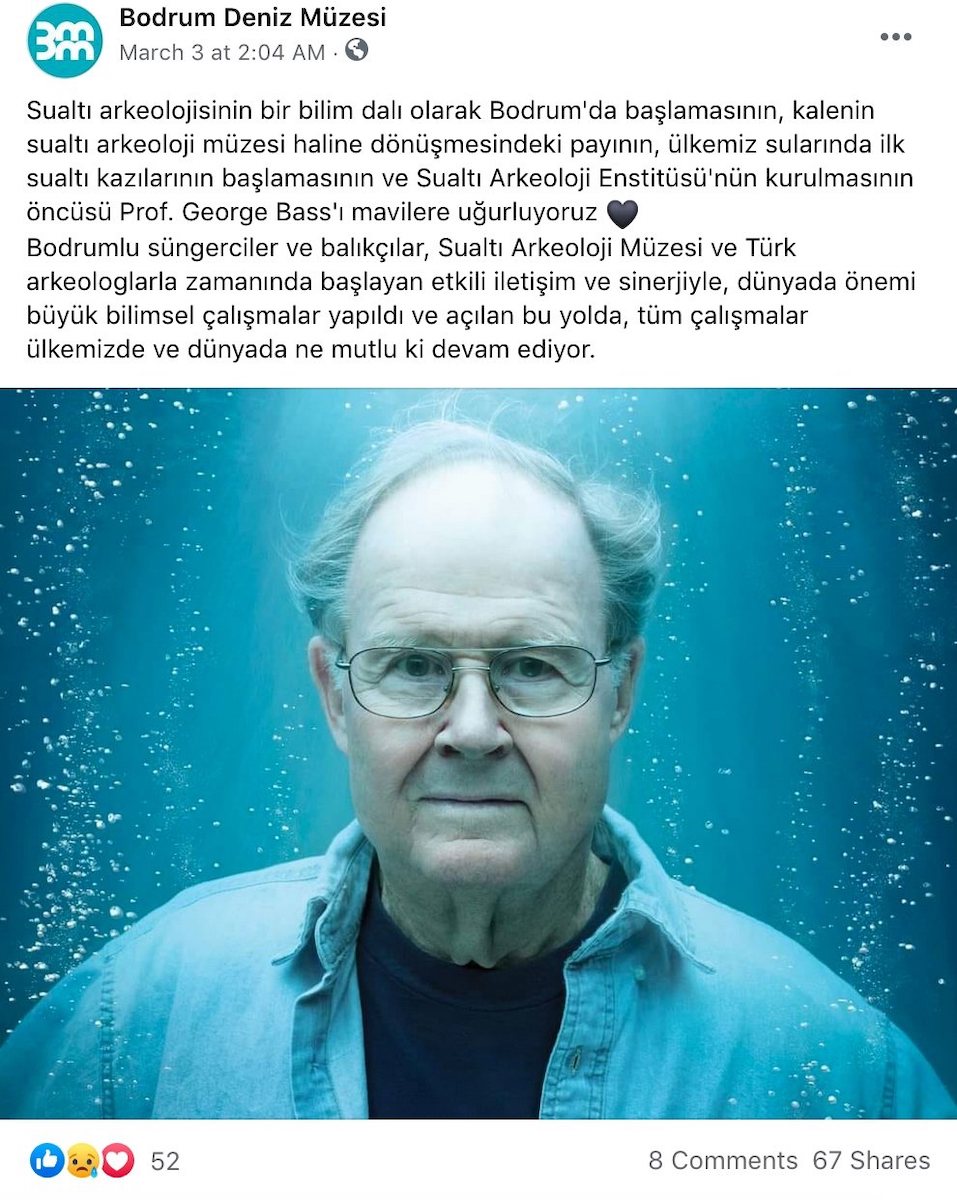
Türkiye’den Prof. Dr. Bass için taziye mesajı – Son Dakika Flaş Haberler
George Bass’a veda – Son Dakika Haberler Milliyet
Son Dakika Güncel Haberler – Su altı arkeolojisi bilim dalının temellerini atan ve ömrünün yarıdan çoğunu Türkiye’de geçiren ABD’li arkeolog Prof. Dr. George Bass, 89 yaşında …

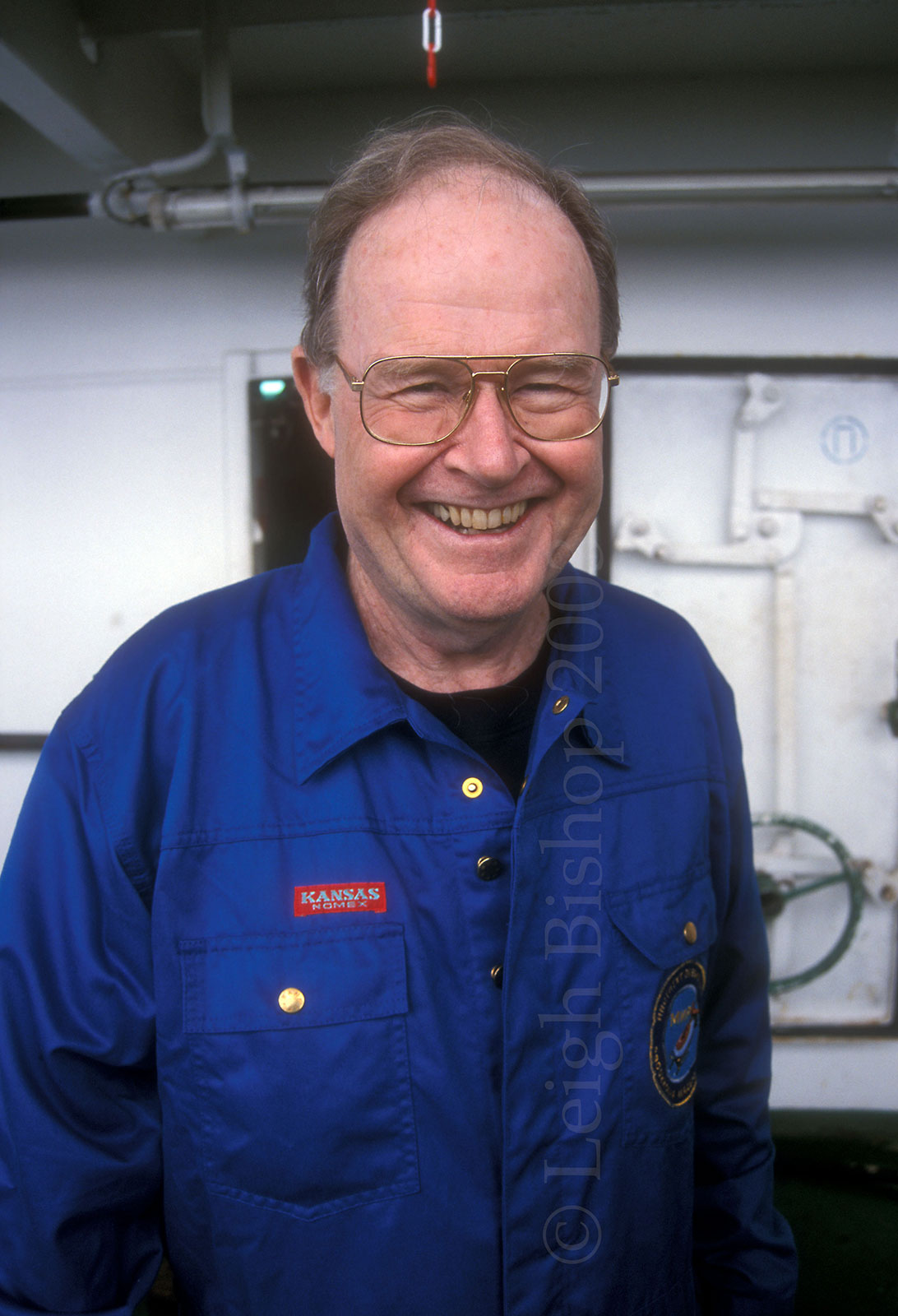
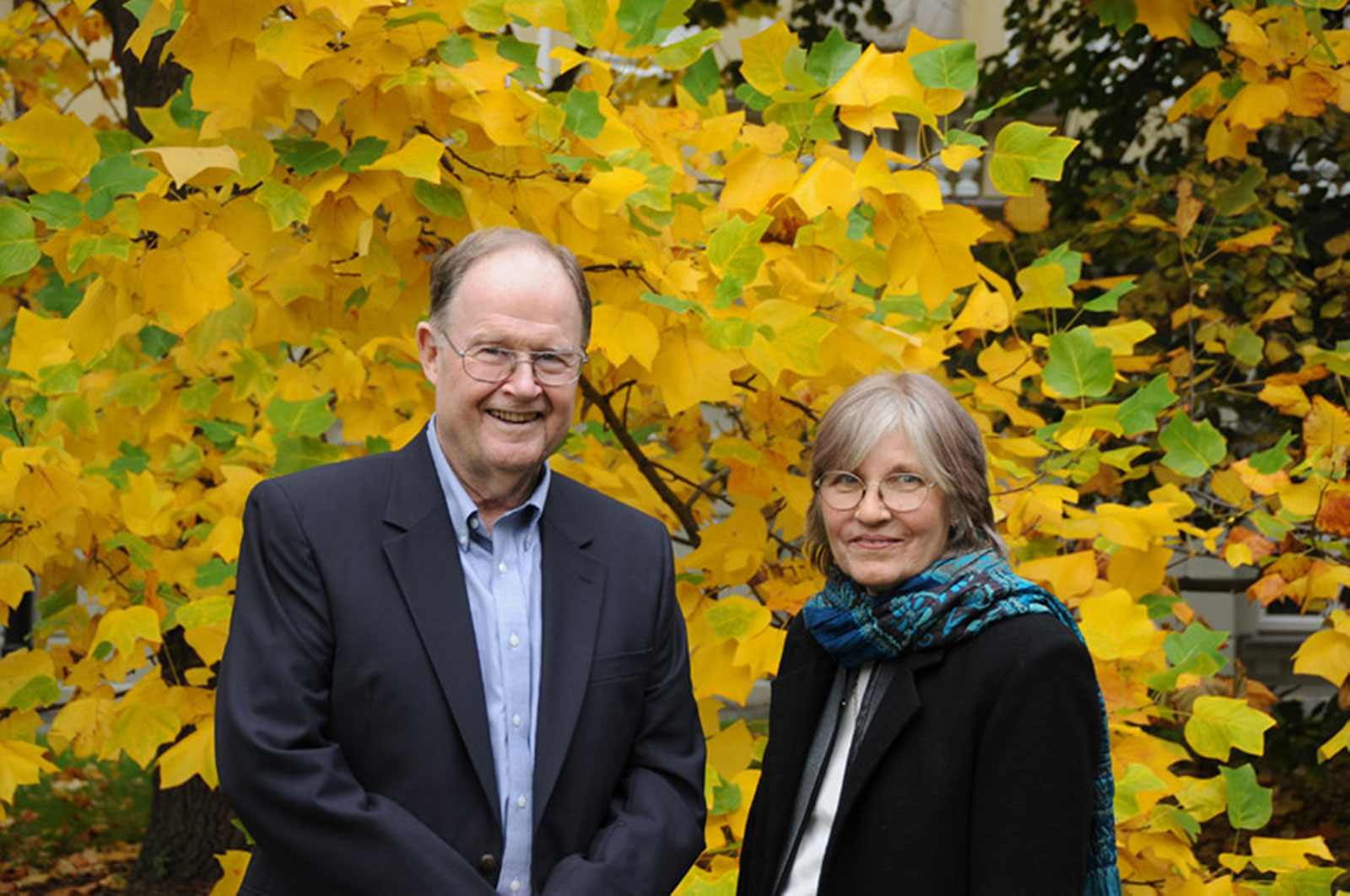

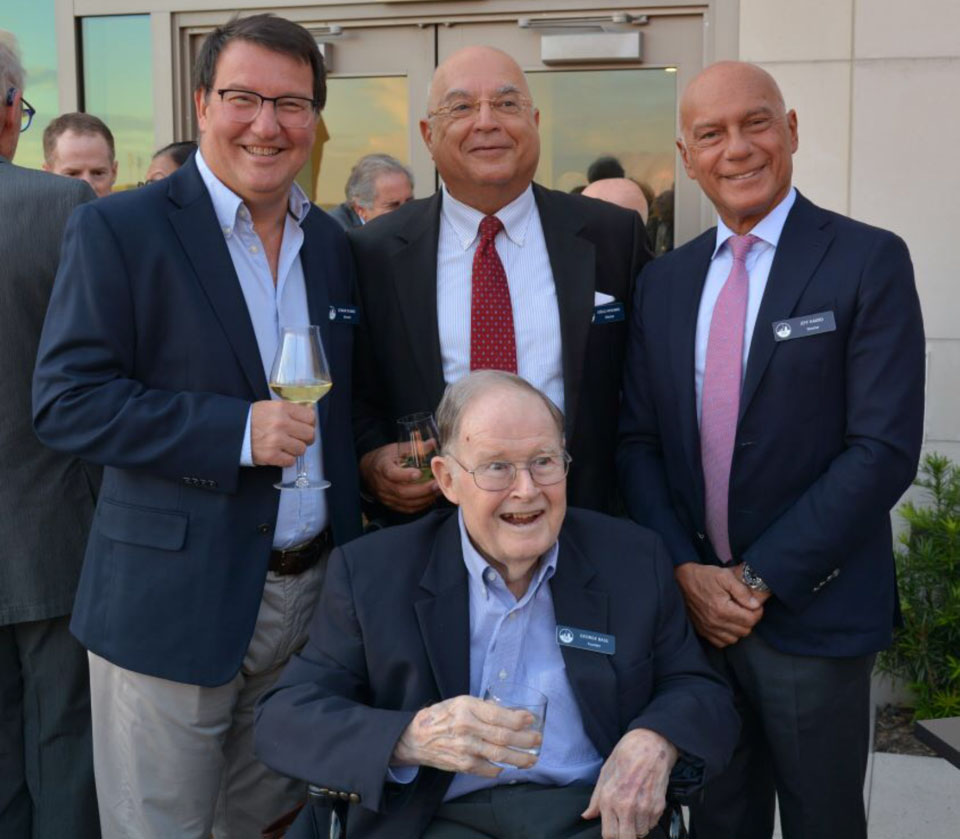

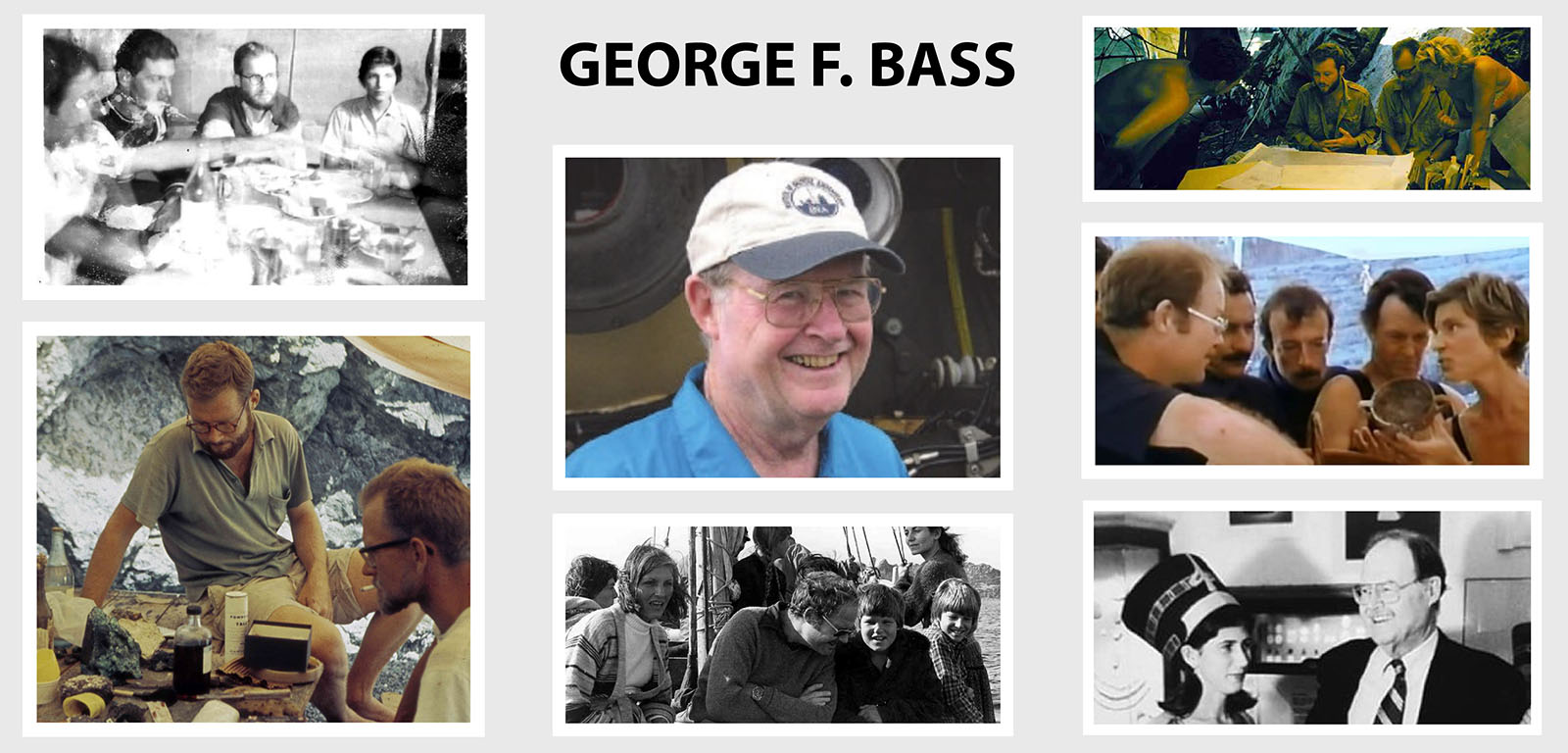

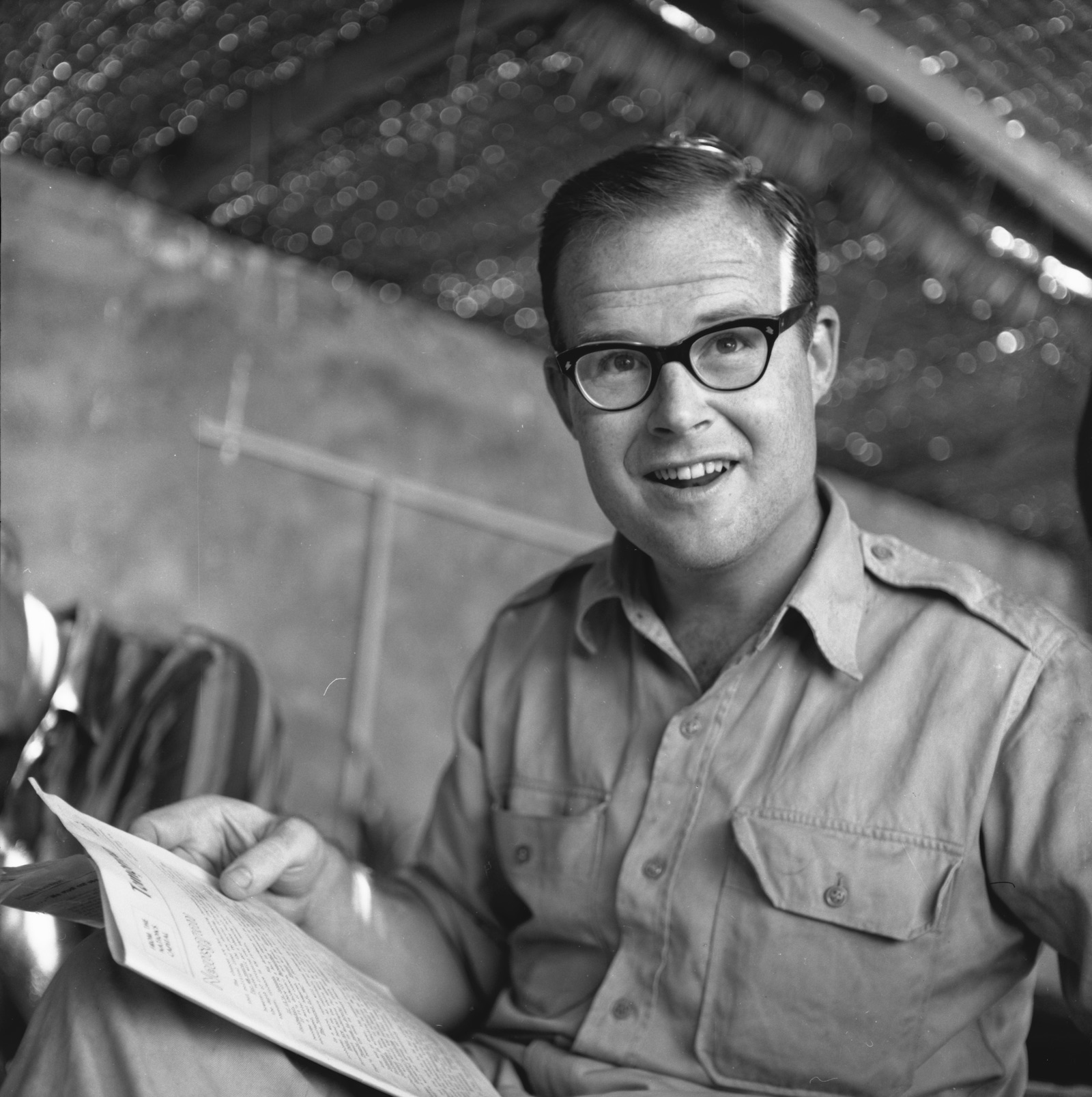

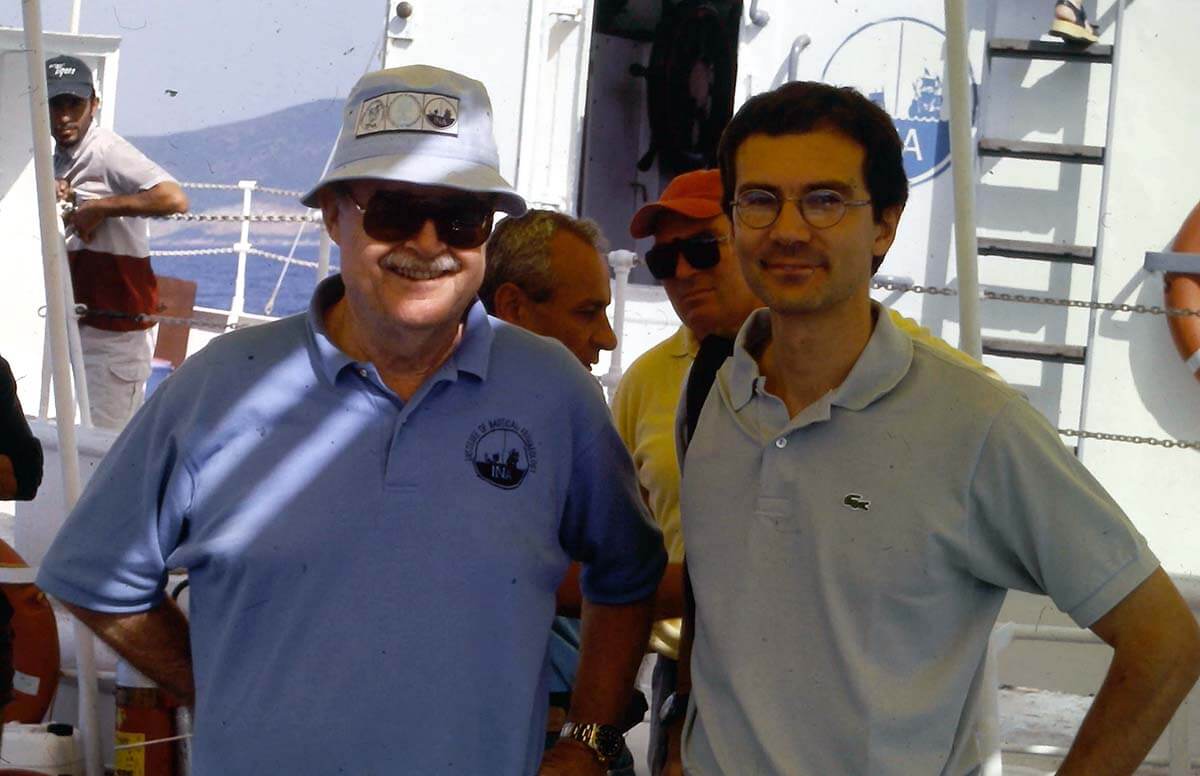


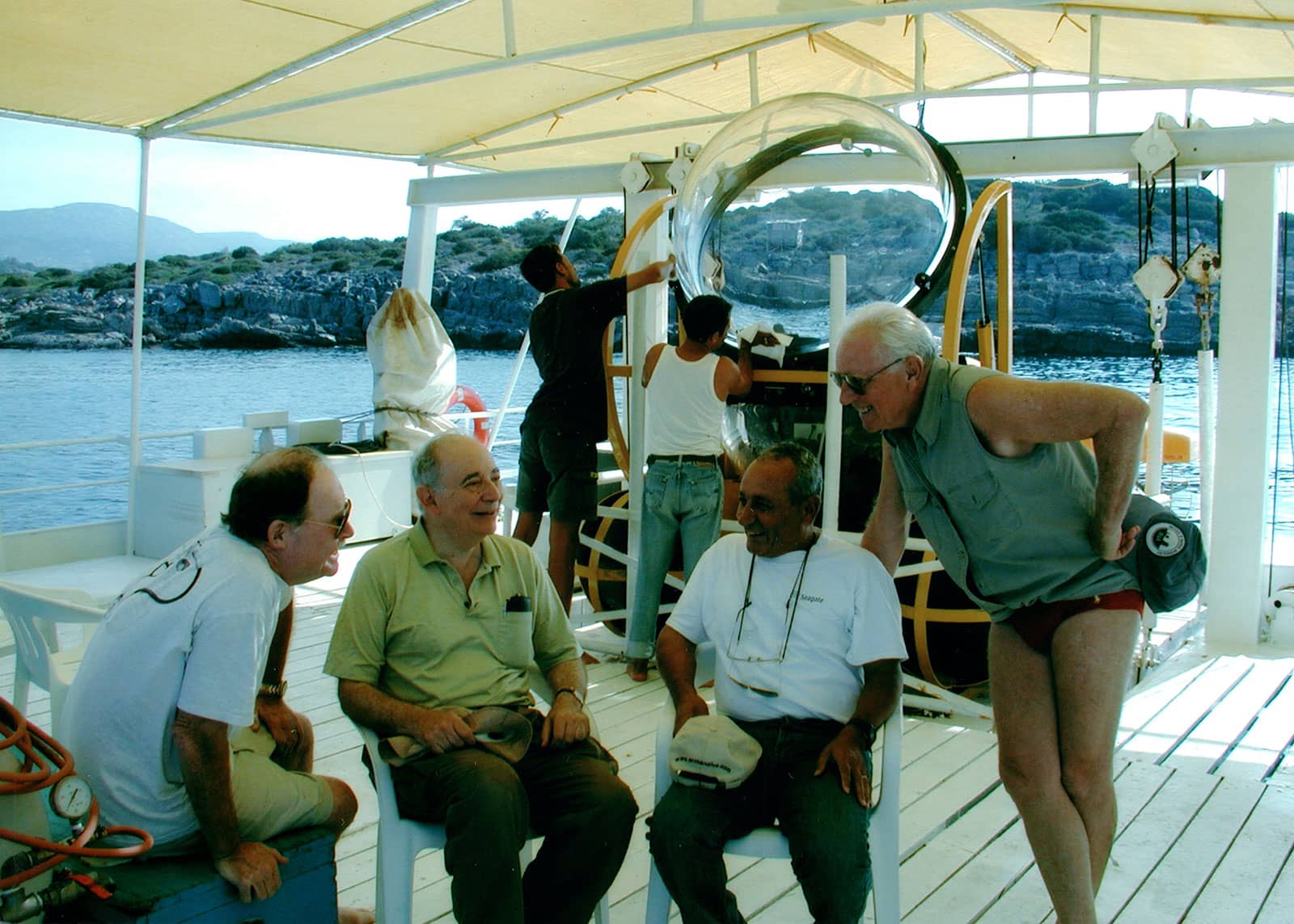
I am very sorry for the death of George BASS, the father of Underwater Archeology. Sleep in the lights. We will always remember him with love.
I have sent you a wonderfull picture of George and his wife Ann from his visit to us in Poland. He was happy here, and our students will never forget his lectures.
Every underwater archaeologist in the world has lost a father. STTL
What a grand man he was! Rest peacefully George.
Not only a great man but a very good man.
The day I got a letter from George informing me about the first finds at Tektas Burnu is burned into my memory forever. THE George Bass wrote to me! Pretty soon thereafter I realized that this was George Bass, the amazingly generous, intellectually curious, and deeply practical guy who was devoted to the field he helped to create. Goodness, could he push us to publish! So many of you knew him better than I did, and I cannot imagine your grief. His friendship is a treasure that will last forever.
I only can say THANK YOU, THANK YOU and THANK YOU.
Dr. Bass was an American treasure who contributed so much to maritime underwater archeology. We were proud to have him as a member of the National Maritime Historical Society’s Advisory Board. On behalf of the trustees and members of the Society I send my sincere condolences to his family.
Directly or indirectly, you surely launched a thousand careers, and one of them was mine.
Prw nfr, George. Prw nfr.
The time I got to spend with George (and Ann) was a irreplaceable gift, and I’m so grateful.
George Bass was exceptionally important to the field of underwater archaeology. From the time I was entering this area as a student, he was one of the people whose work everyone knew and admired. I was very glad later on to get to know him personally. With his passing, we lose one of the great pioneers in exploration of the past through underwater excavation.
He was truly a giant of the field! I am deeply saddened by his passing, of course, but do celebrate what his legacy – the field of nautical archaeology, the Institute of Nautical Archaeology. I had the privilege to be in the last two classes he taught at Texas A&M University and to dive with him at Tektas Burnu. I shall always treasure this and be grateful for the opportunities I had been given. My deepest condolences to Mrs. Bass!
At the end of that Spring Semester of ’99, at his house in Bodrum, Dr. Bass was returning the papers and commenting on them. Finally only my paper was left to be handed back. He smiled and said: It is rare for me to be taught something I did not know by a student.” At this my nose started pointing vertically to the sky… until Dr. Bass continued with a twinkle in his eye: “I have, of course, heard of the Punic Wars. But thanks to Mr. Batchvarov now I have also heard of the PAnic wars…” That particular, unknown to history, war had been caused by 72 sleepless hours, AutoCorrect and Kroum in a joint action. I am thankful that I knew him and had the opportunity to take classes and go in the field with Dr. Bass. May he rest in peace!
I remember when I was very young reading articles in National Geographic about Dr. Bass and Nautical Archaeology. That is when I decided what I wanted to be when I grew up. Thank you Dr. Bass for being such an inspiration to me and for my love of Nautical Archaeology.
I worked with George and Ann in 1964 at Yasi Ada, Turkey. It was a wonderful experience that I will always cherish. I’ve kept in touch with George by email over the years. He was a wonderful gentleman, always taking the time to respond or reply. He will be deeply missed.
Our friendship began with a casual meeting at the bar of the hotel hosting the annual meeting of the Archaeological Institute of America in Hartford in 1961. I had heard George present the results of his triumphal Geledonia excavation and I was inspired to join his team for the next season in Turkey. As a result, I ended up participating in a number of seasons in the 60’s and went on with the Katzev’s to Cyprus after that. That began a mostly long-distance friendship that endured until his death. Our friendship had bonded during the years on Yassi Ada and, although I had disappointed him by not joining his newly founded INA and although separated by great distance, we never lost touch nor did our friendship for one another diminish. We shared the memories of the formative decade of underwater archaeology as it evolved on Yassi Ada along with the close bonds we formed with a number of those who worked with us during that a decade. Many of that formative generation are no longer with us, but George’s legacy and those who collaborated with him and contributed to that legacy under his direction and inspiration, remain his enduring legacy, Those who worked or otherwise studied under him, the publications George produced or directed, and his vision that created the field on underwater archaeology in the United States will continue and expand upon his pioneering efforts. I was privileged to have played a small part during those formative years and to have called George my dear friend and colleague.
Dearest Ann,
I am saddened for your loss and celebrate your life with George in all you have accomplished. Especially Gordon and Alan! (Wish I had been a better math tutor during our time inTurkey) So many memories over the years, wish I were competent enough to attach photos from our time at Serce Liman in in 1979, will work on that.You have my number call or text when you finish a thousand calls so we can talk. Among his many achievements, George was the global impetus for antiquities protections for shipwrecks not sold to treasure hunters by governments but protected and saved for their cultural heritage around the world. (Pretty cool legacy!!)
Just two stories I need to share, post diving having a glass of Raki and hazelnuts in Sece Liman and George would have his glass of Raki and water , a cloudy mixture and a few drops of Raki and it would become crystal clear, part of his magic. (P.S. not rocket science)
The other story is a discussion of my research paper in your dining room. George gave me a very rare compliment on my “excellent”research and then qualified it by admonishing my writing skills,. As I remember it was based on a paragraph ” the contents of the large red amphoras were significantly different from the small, black amphoras” His criticism was emphatic. As I remember, his comment was “Perhaps it is because I am am a fourth generation writer and I probably learned the rule over the dining room table, but everyone knows you cannot use a mutilple modifier in a prepositional phrase” It is one of my memorable moments and inspired me improve my grammatical correctness.
Love you, and my condolences to you, Gordon and Alan
Bob Adams
,
I will forever be grateful to George Bass for inviting me to participate in the excavations at Tektas Burnu. The experience was, quite frankly, one of the best of my professional career: working in a spirit of camaraderie with INA legends, building camp, diving to the limits of my abilities, processing finds, and living on a Turkish coastal cliff with a front row seat where I could watch a master do his work and train the colleagues and students who would continue his legacy. Not everyone gets such a chance. I did. And I owe the experience to George. Thank you from the depths of my soul, George Bey. Rest in peace, my friend.
una lamentable perdida, el GRAN MAESTRO de la arqueología subacuática, a quien tuve el privilegio de conocer y buceamos en la Laguna de la Media Luna, con los alumnos de la ENAH en 1979. Buscaré las fotos, tengo muchas. Buen viaje y gracias por ser tan excelente investigador y promotor de esta necesaria disciplina en el mundo.
May 1962, with a National Geographic article by Peter Throckmorton on the Cape Gelidonia wreck, I first became aware of George Bass. He gave a paper on that wreck in London later that year, at the seminal ‘The Underwater Challenge’ Conference, along with many “names” in those blossoming times of underwater research. I was not there but did purchase the Proceedings (a treasured possession) and can genuinely say that those first two literary works triggered off my own interest, leading to a long career as a maritime archaeological photographer. My deep (pun not intended) and continuing gratitude to George for that.
We were never on an expedition together, but shared good times in 1992 Australia when George spent a week in WA with Jeremy Green, a long-time friend, and the Western Australian Museum’s Department of Maritime Archaeology. That department had come into being, at least in part, by George’s influence. His visit to WA was followed by a visit, along with the WA contingent, across Australia to Sydney where George was the keynote guest at our annual Maritime Archaeological Conference . All of us have such good memories of those times and of having known him.
Vale, old friend!
Her zaman gülen yüzüyle, babacan tavırlarıyla anacağım güzel insan huzurla uyusun.
Yes dear George bey! Thank you for having me in your team. Everyday at Tektas was an amazingly new experience, let us never forget the Artemis adventure….As your camp cook I had to prepare special meals without garlic for you…which were always appreciated. On the surveys with the old Virazon there was never a dull moment. There are so many fond and valuable memories of all the INA gang too many to mention. You empowered everyone in a common purpose. You made Turkey look at itself X
Thank you for all your hard work, everything you’ve accomplished to bring us to this point in our lives and careers, and for the future you established. We will miss you.
George, mi querido amigo, fuiste un excelente colega, modesto y grande en tus enseñanzas al mismo tiempo. Serio y comprensivo con tus colaboradores, muchos y muy variados al principio. Supiste mantener un criterio firme de acuerdo con tus convicciones. El primer proyecto de colaboración INA en España fue con nuestra Universidad de Zaragoza , financiado con cargo al Comité Conjunto Hispano-americano y se desarrolló en el Estrecho de Gibraltar. Fue tu puerta de entrada en España.
Participamos como invitados en Ulu Burum, visitamos las instalaciones en la Texas A&M de College Station y comimos unos buenos filetes de res al modo tejano sobre una gruesa mesa de madera con una hoja de papel como plato y un cuchillo tipo J.Bowie afiladísimo, aunque eso si la ensalada de acompañamiento en recipiente de plástico y la consabida Coca Cola, ajena a nuestra cultura española.
Estuvimos juntos en el Congreso de Jamaica de aquellos años y nunca perdimos el contacto que se fue apagando poco a poco conforme tu salud se resentía.
Muchos amigos y amigas comunes ya han desaparecido y ahora le ha tocado a George. Te recordaremos como un hombre sabio sin pretenderlo, enérgico sin imposiciones y afable en la cercanía, lo que es mucho decir de una gran persona. Nos quedamos con lo bueno, el recuerdo del sol inmisericorde de las rocas de Turquía recuperando las espectaculares piezas de aquellos fondos prodigiosos.
Prof. Manuel Martín-Bueno
My personal connection to Dr. Bass was one sided as he inspired and influenced me though his published works. I was never lucky enough to meet him but I have always had the greatest respect for him. I can honestly say that he in no small part was responsible for my love of nautical archaeology. From a very young age I knew that I wanted be a nautical archaeologist – but life got in the way. Dr. Bass’s work was one of the reasons why I never gave up hope of eventually being able to study the subject properly – and now I have… and still do! The field of nautical archaeology as it is today would not have been possible without Dr Bass. The knowledge that he has shared with the world is priceless. My deepest condolences to all his loved ones at this time.
So sad to hear this news. George was always so kind and thoughtful. Ever since taking his undergraduate course at Texas A&M University in Classical Archaeology, he captivated my imagination about the field of nautical archaeology; like so many others he launched my career and I will be forever grateful. I still remember sitting with him one night in Bozburun, Turkey and talking about life. What a great experience as a young graduate student to have face time with George the person, instead of George the Father of Underwater Archaeology. I will always cherish that memory.
Ann,
Julie and I pass along our deepest condolences. Thank you both for being such an important part of our lives. We are praying for you and your family during your time of grief.
Best,
Brian Jordan and Julie Polzer
George Bass changed Near Eastern archaeology. And I recall his telling us in a talk that, on returning years later to the cove from which they worked on the Uluburun wreck, the locals mentioned that it was called ‘The American cove’, because of their time there, and he felt thrilled that his work had passed into Turkish geographical nomenclature.
I had had a letter from George just a few days ago—therefore the news of his death came as a true shoc.k George and I were students together (for tow academic years) at the American School of Classical Studies in Athens, Greece; then we were colleagues n archaeology, he at UPenn and I at Bryn Mawr College. Through the years our paths crossed many times, and our last encounters were n Philadelphia at meetings of the American Philosophical Society, as members. He was a highly decorated life member of the Archaeological Institute of America, a marvelous lecturer, an enthusiast, a pioneer in nautical archaeology which he founded as a truly rigorous discipline. He will be sorely missed.
Brunilde Sismondo Ridgway
George was the reason I wanted to go into nautical archaeology. He taught me how to be a scholar and helped my career many times. He was always willing to write a letter of recommendation or put in a good word for me, and I wouldn’t be in the field today without his encouragement and support.
He embodied the best of scholarship: endless curiosity, detail-oriented research, the tenacity to study a problem for as long as it took to find a solution, and the willingness to change his mind if a better interpretation arose. You have only to look at his former students to see how well he passed that idea along.
In the classroom, he could fill students with terror. He did not suffer fools well. I remember George staring bored at the classroom ceiling while some poor grad student droned on and on through a tedious presentation. He would let them go for a while, then cut in with an incisive question that usually left them ready to get on Highway 6 and head out of town, never to return.
He knew the right way to motivate students. One time I wore a “Beavis & Butthead” t-shirt to class. Afterwards Dr. Bass remarked casually to me, “You know, Mr. Stewart, when I was a graduate student we wore a suit and tie every day.” I got the message, and while not affluent enough to afford suits, I didn’t show up in that shirt again.
My fondest memory of George is a simple one, of chatting with him while walking to ANTH 351 Classical Archaeology class. By the time I arrived in College Station, Bass was already a senior scholar, yet he would always ask me for my opinion in areas where I had read more recent scholarship than him. That lesson had a profound impact on me, and I try to follow his example.
We will miss him. Our condolences to Ann and the INA family.
David Stewart, Heidi Luchsinger, and Family
We have lost a giant. George Bass advocated simultaneously for what was possible, professional, and yet popular. Like so many others, I discovered him in the pages of the National Geographic, but there was so much more. He inspired and mentored at least two generations of nautical archaeologists. What a gift to see your brainchild grow to full maturity.
Ah, George…rigorous and roguish! His work helped us learn more about our past and our current selves. I feel privileged to have studied and excavated with that oh so rare breed of individual, a true pioneer.
Very saddened even after three days to know that George has left us.Just a week ago he sent me a message via Tuğba hanım for the captain’s son for a special program of whom he cooperated for excavations many years ago..
We were preparing a special issue on George as TINA Turkish Underwater Archaeology Foundation together with collegues at INA.
Turkey is thankful to Prof.George Bass where he will always be remembered with great respect..
I first heard of Dr. Bass after visiting the Bodrum Museum of Underwater Archaeology. After reading his book, Archaeology Beneath the Sea, I learned of his many accomplishments. When I later met Dr. Bass and so many others that were written about in that book at an INA Board Meeting I was impressed by how they were all such great friends after 30 plus years. On the way up to the first Board Meeting as a Director I greeted Dr. Bass in the stairwell. He turned and said to me abruptly and said, “When are you going to start calling me George ?”
So many of us are friends because of what George started. Let’s honor George by keeping these friendships alive and continuing what he started, i.e., nautical archaeology.
Archaeology began a new era when George Bass followed Peter Throckmorton to the Mediterranean and started to look at shipwrecks as historical stories rather than salvage material.
Twenty years of his hard work and brilliant story telling went by before the larger archaeological community would accept shipwrecks as archaeological sites that had integrity and that could be excavated using scientific methods. I was privileged to know George and to talk with him about the value of shipwrecks and the management of the sites. In addition to the TV show Sea Hunt, we ocean lovers had Bass’s National Geographic articles to feed our imaginations. My life has been enriched by George’s work.
I saw a Time article on George in 1984 and immediately plunged into the extraordinary world that he and his colleagues created. He helped me become a scholar, and I’m an instructor today only by his influence. He terrified me in class, but over the years of field and conference encounters I thankfully came to know him more as a person. In 2009 he graciously came to Ithaca for a prestigious lecture series. Lauren and I remember that week with George and Ann as one of the most convivial, rewarding moments of our careers. It was the honor of a lifetime to introduce him then to an appreciative crowd of students, faculty and residents who packed the auditorium night after night. They were hooked, just as I’d been decades earlier.
Bon Voyage, George, and condolences to Ann, Alan, and Gordon.
I remember well his fondness for opera, as he would invite us over each month for Tosca, Otello, The Magic Flute, Carmen, all on the laser disk and sound system that only Cemal knew how to install. But the last aria has been sung, and the opera house is now dark and quiet. A most gracious host at home. A forbidding presence to those who were unprepared in his seminars, and even to those who were prepared. His was a rare combination of vision and relentless drive to succeed that only his passing could still.
My memories are of him laughing as I teased Robin Piercy in the pilot house of the Virazon with jokes about how awful English cars were. And another morning at Uluburun where he took pains to warn us not to grow complacent when diving on such a beautiful day. He had seen such days turn dark before, and did not want anything to happen to us. I am a better scholar and person for having known him.
My sincere sympathies to Ann, Alan, Gordon, and the rest of those who grieve for him. He has returned home.
I must go down to the sea again, to the lonely sea and the sky,
And all I ask is a tall ship and a star to steer her by;
And the wheel’s kick and the wind’s song and the white sail’s shaking,
And a grey mist on the sea’s face, and a grey dawn breaking.
I must go down to the sea again, for the call of the running tide
Is a wild call and a clear call that may not be denied;
And all I ask is a windy day with the white clouds flying,
And the flung spray and the blown spume, and the sea-gulls crying.
I must go down to the sea again, to the vagrant gypsy life,
To the gull’s way and the whale’s way where the wind’s like a whetted knife;
And all I ask is a merry yarn from a laughing fellow-rover,
And quiet sleep and a sweet dream when the long trick’s over.
– John Masefield
Requiescat in pace, good professor.
My then- fiancee Dabney and I met then-junior faculty member George Bass at his office at U.Penn. to apply for slots on a field project he was planning. Like so many others experienced with George, he became a part of our lives from first meeting on. George accepted us to the project right away ( who knows why), then showed us Yassi Ada drawings he was working on. Then, within minutes George was confiding in us about how he knew that needed to stop smoking if he was going to keep diving, how frustrated he was at lack of support by some of his colleagues at Penn, whether he should give up nautical archaeology and work on land in order to fit in better at Penn, whether he should seriously consider going to Cyprus or try to negotiate a position at another US university and so on. We were fascinated and awed by him then and ever since. The field project was on land, of all things, and a disaster worthy of an Agatha Christie novel, through no fault of George, and convinced him to stop smoking, leave Penn, stay with nautical archaeology and go to Cyprus. I still can’t really explain why he shared all this with us, but he did.
I took a detour and became a lawyer, while always remaining in touch with George, as he worked through whether to form what became INA and go to College Station. Soon after INA was formed and I was licensed to practice law, INA and George were threatened with a lawsuit by Caribbean treasure hunters whose plans to break up and sell an early Spanish shipwreck in the Turks and Caicos had been frustrated by a British government decision that it was an archaeological site not a souvenir shop. We all know that George could be melodramatic at times – on that occasion, he asked if I would please defend him and INA in court, but above all he wanted me to know that he did not take care about money, what he wanted to protect if we lost was Ann’s piano and his library. Somehow both survived.
When we overlapped at Ulu Burun or at Bodrum, we always ended up talking long into the night. And it was even more so when he came to stay with us in Washington, especially if we also had Bill Allen (then Chief Editor of National Geographic Magazine and INA Director) with us. I would bail out by midnight, but I can never forget hearing voices in the kitchen at 3 a.m. and rejoining George and Dabney for stories about family histories. It was even like that when George was in Washington to receive the Presidential Medal of Science. I remember that we almost had to be pried from our table by the waiters after virtually everyone else had left.
George had some magnetic force about him. Over the past 20 years or so, I cannot count how many times I have been to meetings or presentations in Mediterranean countries about something concerning archaeology, the sea or shipwrecks, when at the slightest mention of INA or George , or anything close to either subject, people have proudly pulled out a scrapbook or photo album to show me proudly that they had had some letter, postcard or email from George or had posed for a picture. with him. The first couple of times, I was amused by this – then I realized it was a testament to how influential George was.
We will miss him.
I feel so sad. Despite I only met him for some days, his image and work always meant a lot for me. Like an uncle you never see but who has been present in my thoughts about nautical archaeology, for years, I felt him like someone close to me.
Having him and his lovely wife Ann in my conferences in Texas A&M was something which made me feel blessed.
All my condolences to the family and friends. Dear George, sit tibi terra levis
Comments made by members of ICOMOS-ICUCH (International Committee on the Underwater Cultural Heritage)
Dave Nutley – Australia
‘George’s publications and his influence on underwater archaeological theory and practice is legendary but his decision to fly to Australia in 2020 was, for me and many others in this part of the world, momentous. Flying was something that he said he habitually avoided at all costs. To making an exception in order to attend and speak at the 2020 Australasian Institute for Maritime Archaeology conference was a special gift that showed the depth of his commitment to UCH globally. For myself however, the opportunity to spend time with him was a privilege beyond measure. George Bass was and always will be a giant in the underwater archaeological world.”
~~~~~~~
Michel L’Hour – France
“When I have started my career in the late 1970s, George Bass, like Dick Steffy and a few others, was an absolute reference for us. It is sad to imagine that he, in turn, left us. It remains for us to continue on the path they had mapped out.”
~~~~~~~
Akifumi Iwabuchi – Japan
“May his soul rest in peace. My condolences go to the whole family and friends”
~~~~~~
Hakan Oniz – Turkey
“George Bass kept his attention on underwater archaeology until his last days. He sent a letter to congratulate me on new discovery on the 16th-15th Century BC Western Antalya wreck. We have started to collaborate on this wreck’s excavation with INA and he followed every detail of the excavation process from his home.“
~~~~~~
Helena Barba Meinecke – Mexico
“On behalf of the Mexican archaeologists, the departure of Dr. Bass is lamented. Thanks to his visit to Mexico in 1979 and the close relationship that he maintained over time with Pilar Luna, the foundations of Underwater Archeology were established in our country. Among his last works with Mexico, he participated with a tremendously emotional text in the tribute that we are preparing for our beloved Pilar (2021). We wish his wife and his family the best at this time.
En nombre de los arqueólogos mexicanos, se lamenta la partida del Dr. Bass. Gracias a su visita a México en 1979 y a la estrecha relación que mantuvo a lo largo del tiempo con Pilar Luna, se establecieron las bases de la Arqueología Subacuática en nuestro país. Entre sus últimos trabajos con México, participó con un texto tremendamente emotivo en el homenaje que estamos preparando para nuestra querida Pilar (2021). Le deseamos lo mejor a su esposa y su familia en este momento.”
~~~~~~~~
Dan Lenihan – USA
“George and I tangled over method and theory since the mid—1970s. But never over the importance of preserving the maritime past. He was a man you could disagree with and admire in the same moment—not as common a phenomenon as it should be. Good travels George, and best to your family and the remarkable students you inspired.“
~~~~~~~~
Hans Van Tilburg – USA
“We stand on the shoulders of those who came before us…fair winds and following seas, George Bass…”
~~~~~~~~
Chris Underwood – United Kingdom
“I can only share the many sentiments expressed already, but add that although George Bass is sadly no longer with us, he has a left behind a wonderful inspirational legacy that touched so many of us. For me personally, my first reference of his work were his excavations of Mediterranean shipwrecks, such as Cape Gelidonya and Yassi Ada – truly remarkable contributions to our discipline. May he rest in peace and may his family find strength from his life. My sincerest condolences.”
Godspeed George Bey. We all walk in the trail you blazed. I feel very fortunate to have worked with you at Pabaç Burnu, enjoyed your visit to Kizilburun, and loved spending time at INA headquarters in Bodrum with you and Ann. Your stories were endless and your curiosity insatiable, thank you for everything you have done for all us.
I have been honored to be an Associate Director with INA and George since the 1990’s. It had been a wonderful adventure, with trips to Turkey and an opportunity to dive on the UluBurun wrecksite.
To be with George was always greaat fun and very enlightening. He was a great leader and true scholar.
He and Ann made a wonderful team. We will greatly miss him and wish the best for INA in the future
Allan C. Campbell, M.D.
I first met George and Ann in 1967 in Bodrum, the first of four summers in Turkey that included Yassi Ada, Serce Limani and even a complimentary dive on Uluburun! As a recent specialist in diving medicine at the U of Penn, I was delighted to dive into an exciting adventure that would fast become the World of George, the new respected field of underwater archeology. George was unwavering in his determination that archeology underwater replicate the same high standards of land excavations.
Little did I know that 1967 would be the beginning of many new friendships and a stunningly new field of scientific exploration.
This began many years of a close friendship with George, his family and INA. From the beginning our relationship was family oriented including Ann and their boys.
To George: Thank you for your amazing contribution to human history and your treasured friendship. Our friendship was very special. (Everyone was special to George!) He’s left a void. We look forward to keeping the relations strong with Ann, Gordon and Alan for years to come.
John and Nina Cassils
George Bass has been and will continue to be a major positive presence in my life. As a first-year graduate student in 1961, I joined George’s staff and was given the task of keeping the field notes for the excavation of a 7th-century Byzantine shipwreck at Yassıada. The primary purpose of the excavation was to develop efficient techniques for an accurate mapping of deep-water shipwrecks. George (and the rest of the staff) was quite unhappy at my insistence that a considerable amount of time be taken to raise the paltry, unpromising remains of the hull for detailed study on land, but it was done, and George even had me give a publicized lecture at Penn and another at one of the AIA meetings on my efforts to reconstruct the ship. As I turned these efforts into a dissertation, George began a life-long effort toward improving my writing. He also made up for me what was the first ever PhD written exam on nautical archaeology. Later, here at A&M, when time taken to study the anchors and amphoras from the Glass Wreck resulted in very little in the way of publication, George fought fiercely against considerable opposition to my promotion to Full Professor and continued to strongly defend my tardiness in more recent years. Fortunately, George lived to see his faith in me confirmed by an emerging body of important work. I have written the above because the kind of support it illustrates has benefited the lives of numerous students and colleagues touched by George, an important part of his brilliant legacy that should not be overlooked.
To Ann and the INA family – my sincere condolences.
I’ve been reflecting on the very first time I ever heard of nautical archaeology – it was during my junior year at Boston University. Dr. Bass came and gave a lecture as a guest of the Archaeology Department and his colleague Dr. James Wiseman. I had participated in a field school in Greece and was hooked on the terrestrial side. But I sat there that day, alongside my marine biology professor, Dr. Jelle Atema from Woods Hole, who turned to me and said “Now, that’s science!” I decided to double major then and there and went on to the program at A&M. He definitely changed the direction of my career path. When I think of Dr. Bass, what comes to mind is his smile, excitement for discovery and sharing that adventure. He will be missed.
Dear INA directors and friends,
It is with great sadness that I acknowledge your letter announcing George’s passing. He was our founder and our inspiration, and he will be missed by all all over the nautical archaeological world.
I first met him in 1989 at Ulu Burun and since then have been a sincere admirer and friend, visiting him and Ann often in Bodrum.
I always will remember him and miss him.
and know that a great part of INA history is gone, but will live on with the enthousiam and care that all of us will devote to it in the future.
Danielle Feeney
I am deeply saddened by the death of George Bass. I was a student in his first seminar on Naval Archaeology. George (as he asked us to call him) worked with a band of students not as a professor but as a leader in the research seminar. We were breaking new ground with him at the time. As a result of the seminar several students expanded their reports into chapters of George’s Archaeology Under Water. For myself, a report on triremes, with George’s eager help, lead to my first paper at the AIA meetings. We met several times over the years, and my last meeting was at a symposium on Egyptian Archaeology at the Metropolitan Museum where we talked and laughed about those days at Penn. He will be missed.
Some years ago, you, Mr Bass, wrote a short text “The men who stole the stars”. Now it´s the sky who has “stolen” you from us. It is really sad to know about your departure to become an astronaut.
My condolences to your family, friends, colleagues and students. And to the Archaeology. What a great loss.
I will forever be grateful to Dr. Bass for the opportunity to study nautical archaeology and participate in the excavations at Tektas Burnu–it was the adventure and education of a lifetime. He approached life as a grand adventure and created a field that invited so many others to reach under the waves and do the same. We have learned more about our world and humanity in the process. Dr. Bass took the time to write to me as an enquiring undergraduate, and he and Ann both invited us graduate students into their home and came to dinners in our humble apartments, as well. My deepest condolences, Ann. And my deepest gratitude, George Bey.
I like to publish the answer that George Bass, the father of world underwater archeology, wrote to me about my research path on Peter Throckmorton on June 5, 2019.
“Dear Dr. Disantarosa,
I would love to be helpful, but I fear that I was so occupied by m work in Turkey in 1965 that I did not follow Peter’s work in Sicily at all closely. I was not even aware of where he was excavating. To my pleasant surprise, Peter willed all of his notes, photographs, etc. to INA – boxes of unsorted papers, including family correspondence and pictures going back to his childhood di lui. Being retired for nearly 20 years, and no longer driving a car, I almost never visit our offices anymore, and thus don’t even know if our archivist works during the summer when most of our students and faculty are asway. Perhaps Jose, who forwarded your email to me can tell you. … I just found the address of our archivist, so send a copy of this also to that person,
Sincerely,
George ”
He had been retired for 20 years but he continued to dispense advice, to show the way, … THANK YOU for your example and for your courage that has fueled all your scientific research!
To Ann, George’s family, friends, and colleagues – my sincere condolences. I’m not sure if I can say anything that hasn’t been said already, but George was truly special. As an undergraduate, learning about professional underwater archaeology for the first time, I admired him greatly – his pioneering research and tenacity in establishing the field, INA, and the Nautical Archaeology Program at TAMU. When I showed up in Texas a few years later, I met George for the first time on one of his many stops on campus on his way to or from a funeral and was struck by how genuine and nice he was. I got to know George much more through opera nights with the rest of the opera crew, sitting in his rumpus room and enjoying cheese and crackers in the kitchen. Graduate school was a pretty crazy and hectic time, but opera nights were a great break – great conversations with people there because they just genuinely liked opera and wanted to learn more about it. It was an oasis of normalcy in an otherwise very hectic time in my life.
I was delighted to be able to participate in the 2010 field season at Cape Gelidonya – an experience I will remember for the rest of my life. Being at Gelidonya at 27, fifty years after George was there for the first time when -he- was 27 was just not something I would have dreamed of when I was cleaning out the University of Alberta’s library of books on George Bass and nautical archaeology. George will live on in history for his work, of which he should be commended of course – but I hope he is equally remembered for being kind, generous, genuine, and a good friend to many.
It’s impossible to know all the ways in which I learned or benefitted from George, in some instances directly but more often indirectly through the sites he explored that remain central to my own work and the scholars he helped form who then trained others of us. One professional and life lesson most stands out in my mind nearly every day: the “sense of urgency” that George practiced and preached. The field is unimaginable without George, and especially the determined urgency that surely drove his plunge into Cape Gelidonya and drew in so many alongside him. That same driving force was also reflected—and no less remarkable—in the countless letters and emails he patiently and respectfully answered for anyone and everyone who wrote.
I am sad to hear of the passing of George Bass. He was a pioneer in maritime archaeology, and his expertise reached me here in Australia when, as an Honours student in Classics I wrote a research dissertation on the Uluburun Bronze Age wreck in 2000. The work that George Bass and his colleagues conducted and published about that wreck played a significant part in my career and passions.
I’m really stunned to learn that George has passed. For me, he, and the Nautical Archaeology Program at Texas A&M that he created have always been the role model and paradigm of what a great scholar and a great graduate program should be. I really owe him my entire professional career, and whatever positive effect I’ve had on my own students is only a reflection and an echo of the positive effect he had on me, and on all the other student who came to study with him. George was an inspiration and a great mentor who became a friend, although I did not have the opportunity to see him and be in touch as often as I would have liked. I visited him and Ann at their home in College Station two years ago; it was great to reminisce and catch up. I was looking forward to doing so again, the next time I traveled to Texas. I am really heartbroken to know I won’t have that chance. I send my heartfelt condolences to Ann and the rest of George’s family.
The Man Who Saved the Stars
My sincere condolences go out to the entire Bass family. First to his real family: Ann, Gordon, Alan, and grandkids as they mourn the loss of a husband, father, and grandfather. Next, to the worldwide family represented by all those submitting these tributes and who are thinking now of Dr. Bass and the myriad and monumental ways his life affected theirs, and by extension the lives of their own parents, spouses, and children … and employers, employees, their own students, and on and on.
At the risk of relying on a now hackneyed concept that might have drawn derision from Dr. Bass in one of his seminars, I find myself coming back to the pebble-in-a-pond metaphor for how to contemplate a life. The metaphor has been used throughout time and cultures from Neo-Confucian philosophers contemplating the interplay of li and qi to uninspired middle managers choosing trite inspiration posters for cubical walls. It is water-based, so at least apropos in that regard. We are directed to contemplate how far the ripples of our life and actions spread in the pond of the universe; the people who have been inspired and changed for the better; and how the sharing of our unique gifts and talents will change the world. If the act of dropping a pebble into a pond represents intention and courage and the ripples represent energy, work, and relationships that forever alter society, then George Bass heaved in a boulder.
It is heartbreaking to learn of Dr. Bass’ passing. I would like to extend my condolences to his wife Ann, his family, friends, and the professional community. He was larger than life and a force in our field that propelled everyone, who worked with him, to different heights. I remember how he used to say: “There is always place at the top” and that vision, coupled with his knowledge of the field, persuasiveness, and sense of urgency seems to be what all Titans have in common.
It is amazing to read all the tributes here and the stories of how he affected people’s careers and lives over 60+ years. My experience is not much different. Dr. Bass was long retired when I studied in the Nautical Archaeology Program at Texas A&M University, but I was fortunate enough to dive with him at the Tektaş Burnu shipwreck excavation in 2001: he was my dive buddy for a few dives, and we excavated a grid together. It was my first experience in which I actually ‘excavated’ under water (plenty of surveying before). He seemed so old back then (he was only 68), and he seems so young looking at photos from that season now.
As an emeritus, he also taught the class ‘Old World, New World and Real World’ with Filipe Castro in 2004. He told us some of the unwritten narratives of the beginnings of nautical archaeology and its fortuities beginnings (real world). I think most of us were glued to his lectures in that class—I sure was.
Then, the ‘Opera Nights’ that he and Ann organized on Fridays seem to be a thread here (and on social media)—how amazing to think that they instilled in generations of underwater archaeologists a love for opera and provided a very welcome cultural and social event in a college town like College Station.
Dr. Bass built an academic discipline and a vibrant community, which he continued to foster in retirement. It did not matter whether you were a professional or an aspiring student, he played a role in our experiences, and he was a great inspiration and mentor for so many of us. Me included. Rest in peace, Dr. Bass.
I just consider George to be a friend from my days in Turkey through my acquaintance with Tufan Turanli through his nephew Mert Evliyagil. I can recall an interesting evening with Russian Vodka in handblown bottles with aluminum foil caps and caviar from the Caspian Sea, I had done some trading in Izmir. Also, God knows I was never one to turn down a Raki with George when the two of us were in the same place at the same time, like Bodrum. George may be gone, but he will NOT be forgotten. I really wish I had known him years before meeting him in 1987.
I like the short video about George. I had not seen Robin in many years, I think it was when the Wild Boar slide off the Thanksgiving Dinner Table. There were others I recognized, but Tufan is always the easiest. If he and Robin were in a crowd you could always find them or I could, for I too reach into the clouds just not as high as those two.
Incessantly in motion, never settling, always demanding, carving out a new universe and expecting more, creative, unstoppable, expectant, generous, not suffering fools. George, you opened a world for us and demand, ask, plead, cajole us not tiptoe but rather to be bold in your giant footsteps.
I met Professor Bass late, only two years ago, but he has been teaching me since College, in 1987, thru books and papers.
It is very sad to see a life’s reference disappear physically, but his influence and teaches will perdure while there is a sea with History around us.
Buen azul, profesor, que el mar te sea eterno.
Sólo supe que tendría que aprender todo de Vd. y de su obra cuando escuché atentamente a un funcionario de mi administración ponerle verde.
A partir de entonces aprendí, modestamente, lo poco que sé.
STTL, maestro.
Charles W Consolvo
I first became aware of George Bass reading Peter Throckmorton’s book, “Shipwrecks and Archaeology” in 1972. I really wanted to meet him. I had a modest interest in underwater archaeology having lived in Lucrino on the bay of Pozzuoli in 1952 where I explored the Roman ruins of Baia using US Navy rebreathing gear. At the time I was 13 years old.
An acquaintance who knew of George Bass said meeting George was unlikely as he was leery of treasure hunters. Years later, in the late 1980’s I had an invitation from Don Frey, then in Bodrum, to visit. I did, and this was the beginning of a long and exciting relationship with INA. I experienced George’s wonderful traits as described by so many in this memorial, including bringing a good friend to dinner in Bodrum with George and being bored to tears by their avid interest in opera. I participated in a number of INA’s annual survey dives, one of which was the highlight of my diving career.
INA had chartered a Turkish boat with a captain and his wife. My son and I, together with Don Frey and then Board member Marty Wilcox surveyed Yalakavik Harbor searching for a reported wreck. Marty was an engineering genius and had cobbled together a side-scan sonar he built, with a GPS and an Apple computer, to provide real time bottom images with constant positioning. We in fact discovered a wonderful wreck and dove on it from Virazon late one afternoon. Seeing the wreck, an almost perfect mound of amphorae, looming up on the bottom was the most thrilling experience. Returning to Virazon, Don Frey punctured my balloon with the observation that the amphorae were “only 2nd century BC Rhodian types, and they had enough of those”.
Despite the fact that I was certainly not, nor going to become a nautical archaeologist, (I did acquire a master’s degree in historical archaeology in part thanks to a letter of recommendation from George) George was always cordial. We had many conversations, wide ranging over the years, from our progeny to the lamentable lack of entrepreneurship on the part of nautical archaeologists.
As with so many other people with whom he interacted, George imparted a rich and exciting dimension to my life, for which I shall be always grateful.
Amicus pacis
George Bass and his wife Ann have been and continue to be a dynamic moving force with their work and their lives that have touched so many people in varied disciplines. George’s work has been more than just inspirational to those whose lives he has touched – it has been motivational as well. He wrote me a lengthy and treasured letter just a few years ago and his humble and gentle nature was in every word as he spoke of how much we have learned about ships and shipbuilding and yet of how much we do not know and must seek out as time unfolds.
Our museum tour guides speak of George and Ann and of their development of the INA and of its importance every day. George found his true calling in life in all that he applied himself to in his work and in his personal life. As Thomas Carlyle said so well of such men who find their true work – “let him ask no other blessedness”.
David & Maryruth Warther
and Staff at David Warther Carvings
Sugarcreek, Ohio USA
What an inspiration. Certainly the guiding light for my passion in maritime archaeology.
I remember George so well from the early days of excavation in the US and in Turkey. We were all figuring things out as we went along and it was a fascinating ride. His spirit and sense of humor were a driving force for all of us. George inspired me to stay interested in the field for my lifetime. He will be sorely missed.